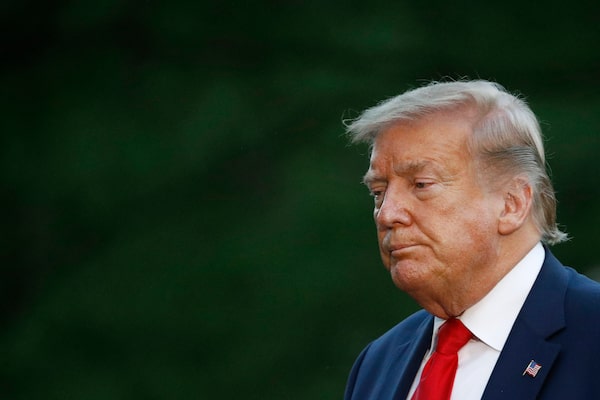
It’s true that Donald Trump, seen here on May 30, 2020, was blasting China for years. And now many countries, such as Canada, realize they would need allies in dealing with Beijing.Patrick Semansky/The Associated Press
Angela Merkel did every G7 leader a favour when she saved them from standing next to U.S. President Donald Trump at a mid-pandemic summit while U.S. cities are burning.
The summit was conceived by Mr. Trump as the symbol of a grand, U.S.-led postpandemic reopening, which would be focused on the issue he wants to underline: confronting China.
With another president, at another time, the idea that the United States wants to lead a common front to push back against China’s crackdown in Hong Kong and its aggressive efforts to stifle and intimidate other nations should be cause for Group of Seven countries to celebrate.
Yet Mr. Trump is the last person to lead the world in dealing with China.
That’s not because Mr. Trump’s most notable reaction to the protests over a Minneapolis police officer’s merciless killing of a black man, George Floyd, was that looters would be shot, and his moral authority is not something world leaders want to lean on.
Several G7 leaders, including Prime Minister Justin Trudeau, were stalling on Mr. Trump’s invitation to a hastily arranged summit even before Ms. Merkel quashed the whole thing by saying she won’t go. It meant leaders would have to breach their own coronavirus lockdowns to risk some new Trump drama in the midst of a major crisis.
But there is also a basic problem with the notion of Mr. Trump calling together world leaders to forge a common front against China. He can’t be trusted to do it.
It’s true that Mr. Trump was blasting China for years. And now many countries, such as Canada, realize they would need allies in dealing with Beijing.
That should be clear after China imprisoned two Canadians, Michael Kovrig and Michael Spavor, in retaliation for the arrest of Huawei chief financial officer Meng Wanzhou on a U.S. extradition request. But China has been using its economic leverage to squeeze countries for years. Norway’s salmon exports to China were cut off when Chinese human-rights activist Liu Xiaobo won the Nobel Peace Prize in 2010.
“China, because of its size, and because you’ve got authoritarian capitalism at work there, has picked us all off one by one,” said Senator Peter Boehm, a former senior foreign-affairs official who served as Canada’s “Sherpa” – a behind-the-scenes lead organizer – for G7 summits.
So a common front seems ideal. But Mr. Trump isn’t really going to lead it. He sees U.S. interests, and his interests, as unique. He doesn’t believe in alliances.
He took office threatening a trade war with China, but he made any potential ally, including Canada, fear more for their trade ties with the U.S.
Before the Charlevoix Summit in 2018, G7 countries were working on plans for a mechanism to share information about Chinese trade practices across G7 and European Union countries, prompted by Mr. Trump’s attacks on the dumping of Chinese steel, Mr. Boehm recalled. Then he got a call from Gary Cohn, then Mr. Trump’s senior economic adviser, telling him the White House had decided to go it alone by imposing tariffs on steel. “I said, that’s interesting. China won’t be happy,” Mr. Boehm added. Then Mr. Cohn told him tariffs would be imposed on everyone.
Mr. Trump was never interested in a common front. He cared about trade balance, not trade practices. With China, his solution was to get the Chinese to agree to buy more American goods. While he negotiated his phase one trade deal, he stayed pretty quiet about Hong Kong. If there’s a phase two, it won’t be about allies.
Now that the U.S. President is talking about confronting China again, he’s not threatening to tear up that trade deal. He is cutting off ties with the World Health Organization.
It’s a good sign that the U.S. seems to think there is value in working with other countries. Last week, it issued a joint statement on Hong Kong with Canada, Britain and Australia. And of course, there was the idea of a summit focused on China.
But the more encouraging sign is that other countries are pushing for it. Britain wants G7 countries to take a common position on excluding Huawei technology from their wireless networks, and Australia led early calls for an investigation into the handling of COVID-19. Mr. Trudeau, timid on China so far, will have to get involved, too. Almost by definition, Mr. Trump cannot lead a common front.
Our Morning Update and Evening Update newsletters are written by Globe editors, giving you a concise summary of the day’s most important headlines. Sign up today.
 Campbell Clark
Campbell Clark